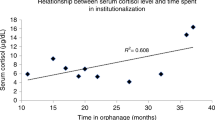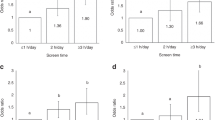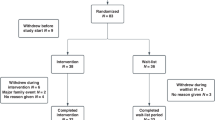Abstract
Background
Children with developmental delays have a great impact on their families. Educating families on how to interact with their children is an important task. Therefore, we assessed the short-term effectiveness of the workshop for children with global developmental delays.
Methods
In total, 101 children aged 18–36 months with global developmental delays, all with language delay along with other developmental delays, and their parents participated in six 2-h family-centered workshop sessions for six weeks. Measures were taken before and after the workshop, including the Mandarin-Chinese Communicative Developmental Inventory, Peabody Developmental Motor Scales, Emotional Competency Rating Scales, Pediatric Outcomes Data Collection Instrument, Pediatric Evaluation of Disability Inventory, Pediatric Daily Occupation Scale, Pediatric Quality of Life Inventory (PedsQL), Caregiver Strain Index, and PedsQL-Family Impact Module.
Results
Significant improvements with a small or intermediate effect size in emotions, upper extremity and physical functioning and global functioning, daily occupation performance in sensorimotor, communication, cognitive autonomy, and psychosocial domains, and parental quality of life and family impact were noted with high workshop satisfaction.
Conclusion
Short-term family-centered workshop is effective for children with global developmental delays. However, due to the lack of follow-up after the intervention, it should be careful in inferring the developmental gain effect.
Impact
-
The effectiveness of short-term family-centered workshops on children with global developmental delays remains uncertain.
-
Short-term family-centered workshops improved the children’s emotions, physical functional performance, and occupational performance in daily life.
-
The short-term family-centered workshop is practical and effective for children with global developmental delays.
-
Further long-term, large-scale, prospective, randomized trials are warranted to confirm these results.
Clinical trial registration
ClinicalTrials.gov ID: NCT05418933
Similar content being viewed by others
Log in or create a free account to read this content
Gain free access to this article, as well as selected content from this journal and more on nature.com
or
Data availability
The datasets generated during and analyzed during the current study are available from the corresponding author upon reasonable request.
References
Global Research on Developmental Disabilities Collaborators. Developmental disabilities among children younger than 5 years in 195 countries and territories, 1990-2016: a systematic analysis for the Global Burden of Disease Study 2016 [published correction appears in Lancet Glob Health. 2018 Dec;6(12):e1287]. Lancet Glob. Health 6, e1100–e1121, https://doi.org/10.1016/S2214-109X(18)30309-7 (2018).
Sherr E. H. & Shevell M. I. Mental retardation and global developmental delay, in: Swaiman, K.F., Ashwal, S., Ferriero, D.I. (Eds.), Pediatric Neurology, Principles and Practice, fifth ed. Mosby, Philadelphia, 2006.
Shevell, M. et al. Practice parameter: evaluation of the child with global developmental delay: report of the Quality Standards Subcommittee of the American Academy of Neurology and The Practice Committee of the Child Neurology Society. Neurology 60, 367–380, https://doi.org/10.1212/01.wnl.0000031431.81555.16 (2003).
Law, J., Dennis, J. A. & Charlton, J. J. V. Speech and language therapy interventions for children with primary speech and/or language disorders. Cochrane Database Syst. Rev. 2017, CD012490 (2017).
Chen, H. J., Hsin-Ju Ko, M., Li, S. T., Chiu, N. C. & Hung, K. L. Prevalence of preschool children developmental disabilities in northeastern Taiwan - Screening with Taipei City Developmental Screening Checklist for Preschoolers, 2nd Version. J. Formos. Med. Assoc. 119, 1174–1179, https://doi.org/10.1016/j.jfma.2020.02.001 (2020).
McMurray, B. Defusing the childhood vocabulary explosion. Science 317, 631, https://doi.org/10.1126/science.1144073 (2007).
Wake, M. et al. Outcomes of population based language promotion for slow to talk toddlers at ages 2 and 3 years: Let’s Learn Language cluster randomised controlled trial. BMJ 343, d4741, https://doi.org/10.1136/bmj.d4741 (2011). Published 2011 Aug 18.
Buschmann, A. et al. Parent based language intervention for 2-year-old children with specific expressive language delay: a randomised controlled trial. Arch. Dis. Child 94, 110–116, https://doi.org/10.1136/adc.2008.141572 (2009).
Jeong, J., Pitchik, H. O. & Fink, G. Short-term, medium-term and long-term effects of early parenting interventions in low- and middle-income countries: a systematic review. BMJ Glob. Health 6, e004067, https://doi.org/10.1136/bmjgh-2020-004067 (2021).
Ou, S.-R. Pathways of long-term effects of an early intervention program on educational attainment: findings from the Chicago longitudinal study. J. Appl. Dev. Psychol. 2005;26:578–611.
Reynolds, A. J., Temple, J. A., Robertson, D. L. & Mann, E. A. Long-term effects of an early childhood intervention on educational achievement and juvenile arrest: a 15-year follow-up of low-income children in public schools. JAMA 285, 2339–2346, https://doi.org/10.1001/jama.285.18.2339 (2001).
Armstrong, J. et al. Randomised controlled trial of a therapeutic playgroup for children with developmental delays. J. Autism Dev. Disord. 51, 1039–1053, https://doi.org/10.1007/s10803-020-04580-7 (2021).
Lin, L. Y., Yu, W. H., Lin, W. P., Chen, C. C. & Tu, Y. F. Agreement between caregivers’ concerns of children’s developmental problems and professional identification in Taiwan. Front Pediatr. 10, 804427, https://doi.org/10.3389/fped.2022.804427 (2022).
Communication Development in Children with Language Delays, 2016. The Hanen Centre. Available online: http://www.hanen.org/About-Us/What-We-Do/Early-Childhood-Language-Delays.aspx.
McCauley, R. J., Marc E. F. & Ronald B. G. Treatment of Language Disorders in Children., 2017. Internet resource.
Lin, C. L., Lin, C. K. & Yu, J. J. The effectiveness of parent participation in occupational therapy for children with developmental delay. Neuropsychiatr. Dis. Treat. 14, 623–630, https://doi.org/10.2147/NDT.S158688 (2018).
Dunst, C. J., Trivette, C. M. & Hamby, D. W. Meta-analysis of family-centered helpgiving practices research. Ment. Retard Dev. Disabil. Res Rev. 13, 370–378, https://doi.org/10.1002/mrdd.20176 (2007).
Bailey, D. B., Raspa, M. & Fox, L. C. What is the future of family outcomes and family-centered services. Top. Early Child. Spec. Educ. 31, 216–223, https://doi.org/10.1177/0271121411427077 (2012).
Hsieh, R. L., Hsieh, W. H. & Lee, W. C. Short-term family-centered workshop for children with developmental delays enhances family functioning and satisfaction: A prospective clinical trial. Med. (Baltim.) 95, e4200, https://doi.org/10.1097/MD.0000000000004200 (2016).
Hsieh, W. H., Lee, W. C. & Hsieh, R. L. Effects of a family-centered workshop for children with developmental delays. Med. (Baltim.) 97, e12106, https://doi.org/10.1097/MD.0000000000012106 (2018).
World Health Organization. International classification of functioning, disability and health: ICF. World Health Organization, 2001. https://apps.who.int/iris/handle/10665/42407.
Liu, H. M. & Tsao, F. M. The standardization and application of mandarin-chinese communicative developmental inventory for infants and toddlers. Formosa J. Ment. Health 23, 503–534 (2010). (in Chinese).
Provost, B. et al. Concurrent validity of the Bayley Scales of Infant Development II Motor Scale and the Peabody Developmental Motor Scales-2 in children with developmental delays. Pediatr. Phys. Ther. 16, 149–156 (2004).
van Hartingsveldt, M. J., Cup, E. H. & Oostendorp, R. A. Reliability and validity of the fine motor scale of the Peabody Developmental Motor Scales-2. Occup. Ther. Int 12, 1–13, https://doi.org/10.1002/oti.11 (2005).
Wei W. J. et al. Emotional Competency Rating Scale for Young Children. Psychological Press, Taiwan. Available online: http://www.psy.com.tw/ec99/ushop20128/GoodsDescr.asp?category_id=123&parent_id=118&prod_id=87320. Published July 2011.
Haynes, R. J. & Sullivan, E. The Pediatric Orthopaedic Society of North America pediatric orthopaedic functional health questionnaire: an analysis of normals. J. Pediatr. Orthop. 21, 619–621 (2001).
Hsieh R. L., Huang H. Y. & Lee W. C. The correlation of pediatric outcome data collection instrument with health related quality of life, emotion in children and their parents with developmental delays. Taiwan Acad. Phys. Med. Rehab. 131, 2009.
Hsieh, R. L., Lin, M. I., Huang, H. Y. & Lee, W. C. The relationship between the Pediatric Outcomes Data Collec-tion Instrument and functional impairment in developmentally delayed Chinese children and their parents’ health: implications for child and family-centered medicine. Int. J. Pers. Cent. Med. 1, 574–580. (2011).
Haley, S. M. et al. Lessons from use of the Pediatric Evaluation of Disability Inventory: where do we go from here. Pediatr. Phys. Ther. 22, 69–75, https://doi.org/10.1097/PEP.0b013e3181cbfbf6 (2010).
Chen, K. L., Tseng, M. H., Hu, F. C. & Koh, C. L. Pediatric evaluation of disability inventory: a cross-cultural comparison of daily function between Taiwanese and American children. Res Dev. Disabil. 31, 1590–1600, https://doi.org/10.1016/j.ridd.2010.05.002 (2010).
Lo, J. L., Yao, G. & Wang, T. M. Development of the Chinese language paediatric daily occupation scale in Taiwan. Occup. Ther. Int 17, 20–28 (2010).
Chan, L. F., Chow, S. M. & Lo, S. K. Preliminary validation of the Chinese version of the Pediatric Quality of Life Inventory. Int J. Rehabil. Res 28, 219–227, https://doi.org/10.1097/00004356-200509000-00004 (2005).
Chan, L. F., Chow, S. M. & Lo, S. K. Preliminary validation of the Chinese version of the Pediatric Quality of Life Inventory. Int J. Rehab. Res 28, 219–227, https://doi.org/10.1097/00004356-200509000-00004 (2005).
Chan, W. C., Chan, C. L. & Suen, M. Validation of the Chinese version of the Modified Caregivers Strain Index among Hong Kong caregivers: an initiative of medical social workers. Health Soc. Work 38, 214–221, https://doi.org/10.1093/hsw/hlt021 (2013).
Hsueh, Y. M. et al. Association of blood heavy metals with developmental delays and health status in children. Sci. Rep. 7, 43608, https://doi.org/10.1038/srep43608 (2017). Published 2017 Mar 2.
Hsieh, R. L. et al. Quality of life and impact of children with unclassified developmental delays. J. Paediatr. Child Health 49, E116–E121, https://doi.org/10.1111/jpc.12081 (2013).
Mas, J. M. et al. Family-centered practices and the parental well-being of young children with disabilities and developmental delay. Res Dev. Disabil. 94, 103495, https://doi.org/10.1016/j.ridd.2019.103495 (2019).
Boyle, J. Speech and language delays in preschool children. BMJ 343, d5181, https://doi.org/10.1136/bmj.d5181 (2011).
Sunderajan, T. & Kanhere, S. V. Speech and language delay in children: Prevalence and risk factors. J. Fam. Med. Prim. Care 8, 1642–1646, https://doi.org/10.4103/jfmpc.jfmpc_162_19 (2019).
Dornelas, L. F. et al. Functional outcome of school children with history of global developmental delay. J. Child Neurol. 31, 1041–1051, https://doi.org/10.1177/0883073816636224 (2016).
Kellegrew, D. H. Creating opportunities for occupation: an intervention to promote the self-care independence of young children with special needs. Am. J. Occup. Ther. 52, 457–465, https://doi.org/10.5014/ajot.52.6.457 (1998).
Beheshti, S. Z., Hosseini, S. S., Maroufizadeh, S. & Almasi-Hashiani, A. Occupational performance of children with autism spectrum disorder and quality of life of their mothers. BMC Res. Notes 15, 18, https://doi.org/10.1186/s13104-021-05890-4 (2022). Published 2022 Jan 15.
Michelsen, S. I. et al. Frequency of participation of 8-12-year-old children with cerebral palsy: a multi-centre cross-sectional European study. Eur. J. Paediatr. Neurol. 13, 165–177, https://doi.org/10.1016/j.ejpn.2008.03.005 (2009).
Hsieh, R. L., Lin, M. I., Huang, H. Y. & Lee, W. C. Correlations between functional performance, health-related quality of life, and parental impact on children with developmental delays. Dev. Neurorehab. 17, 176–183, https://doi.org/10.3109/17518423.2012.747569 (2014).
Hsieh, R. L., Lin, I. M., Huang, H. Y. & Lee, W. C. The relationship between the Pediatric Outcomes Data Collection Instrument and functional impairment in developmentally delayed Chinese children and their parents’ health: Implications for child and family-centered medicine. Int J. Pers. Cent. Med. 1, 574–580 (2011).
Acknowledgements
We thank Yi-Jung Wu for the valuable technical support in this study. This study was partially supported by research grants from Shin Kong Wu Ho-Su Memorial Hospital (2019SKHADR037, 2020SKHADR035, 2021SKHADR032, and 2022SKHADR033) and the Ministry of Science and Technology, Taiwan (MOST-102-2314-B-341-001, MOST 104-2314-B-002-118-MY3, MOST-105-2314-B-341-002, MOST-105-2314-B-002-049-MY3, MOST-106-2314-B-341-003-MY2, MOST 108-2314-B-341-003, MOST 108-2314-B-002-127-MY3, MOST 109-2314-B-341-001, and MOST 111-2314-B-002 -089 -MY3). The funders had no role in the study design, data collection, analysis, publishing decision, or manuscript preparation.
Author information
Authors and Affiliations
Contributions
R.L.H. and W.H.H. made substantial contributions to the conception and design, and acquisition and interpretation of data. W.H.H., P.C.H., P.C.T., W.T.L. and Y.H. collected data. W.C.L. provided statistical advice and analyzed the data. WHH and RLH drafted the manuscript, and all authors gave final approval of the version to be published.
Corresponding author
Ethics declarations
Competing interests
The authors declare no competing interests.
Ethics approval and consent to participate
This study analyzed data from a randomized clinical trial that required informed consent from a parent of every patient prior to enrollment.
Additional information
Publisher’s note Springer Nature remains neutral with regard to jurisdictional claims in published maps and institutional affiliations.
Rights and permissions
Springer Nature or its licensor (e.g. a society or other partner) holds exclusive rights to this article under a publishing agreement with the author(s) or other rightsholder(s); author self-archiving of the accepted manuscript version of this article is solely governed by the terms of such publishing agreement and applicable law.
About this article
Cite this article
Hsieh, WH., Huang, P.C., Tsai, PC. et al. Short-term multidisciplinary family-centered workshop for preschool children with global developmental delays. Pediatr Res 94, 707–714 (2023). https://doi.org/10.1038/s41390-023-02507-3
Received:
Revised:
Accepted:
Published:
Version of record:
Issue date:
DOI: https://doi.org/10.1038/s41390-023-02507-3



